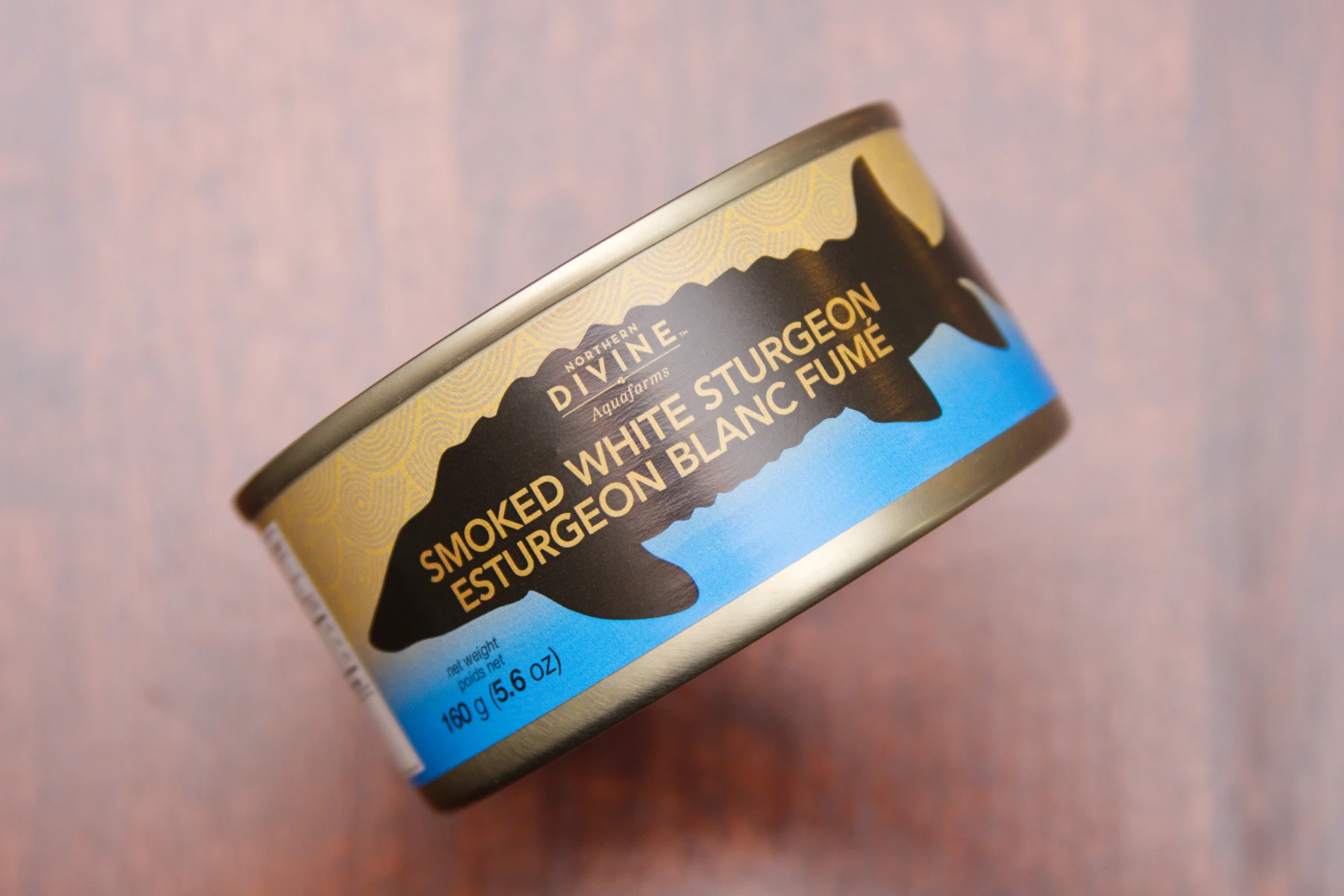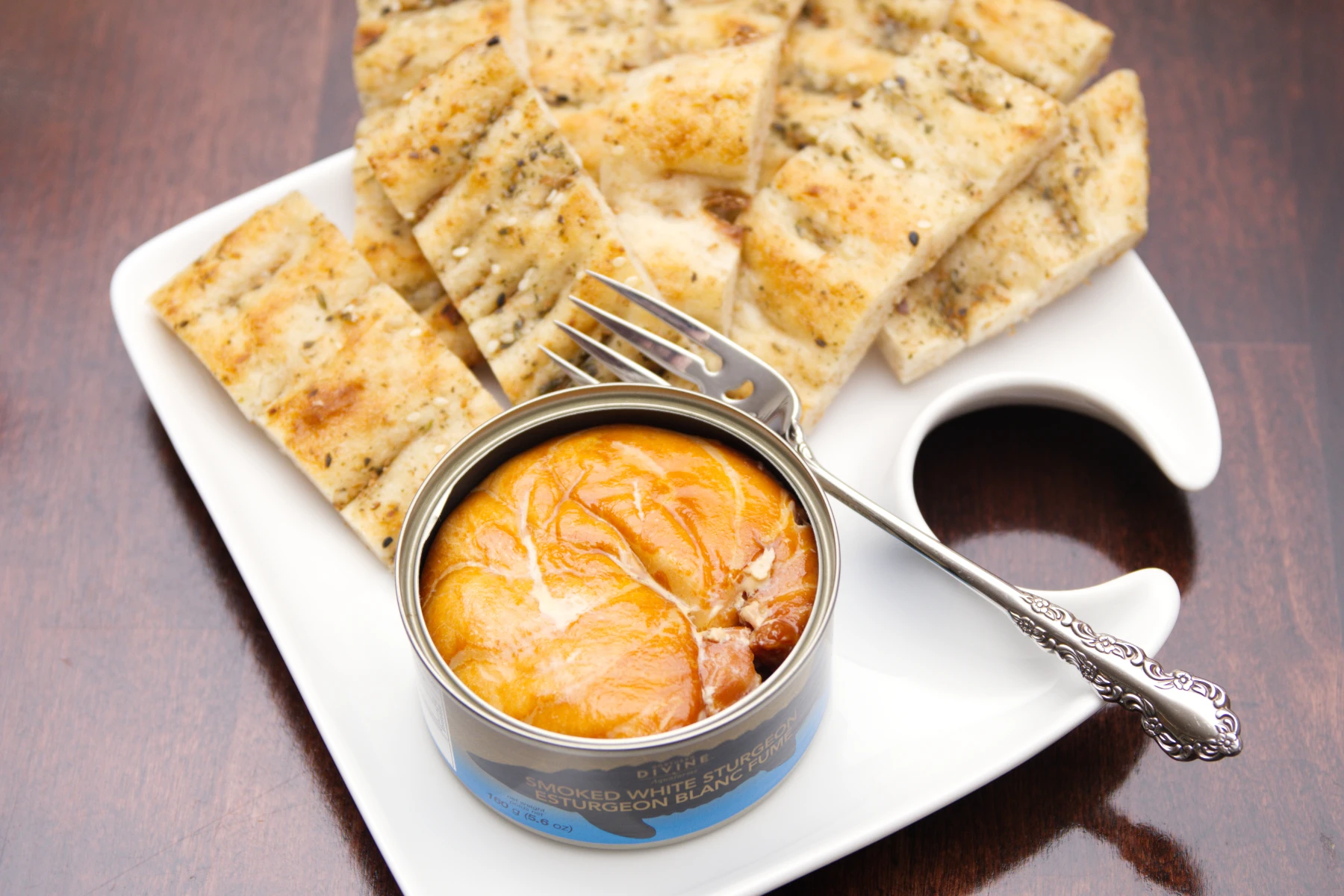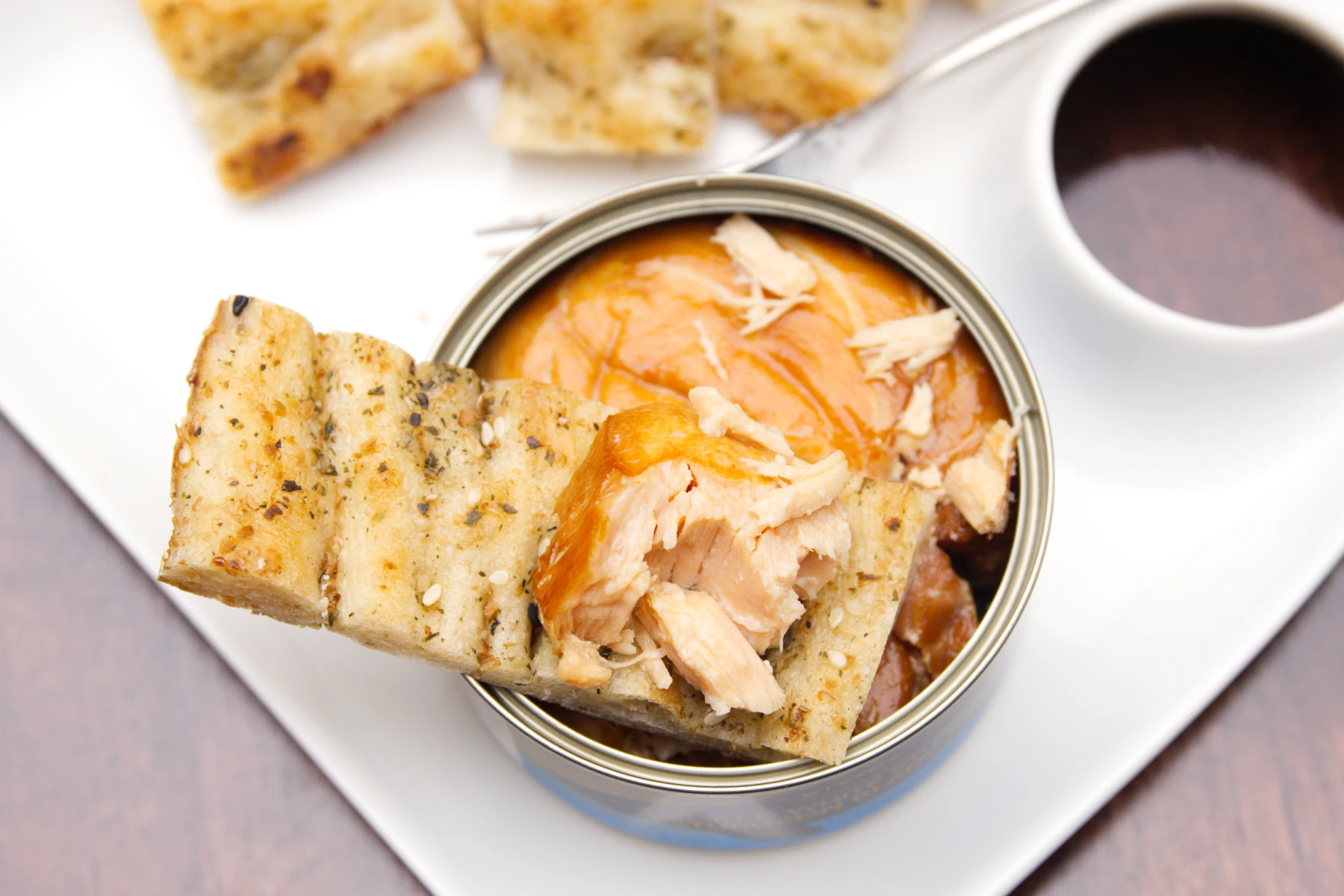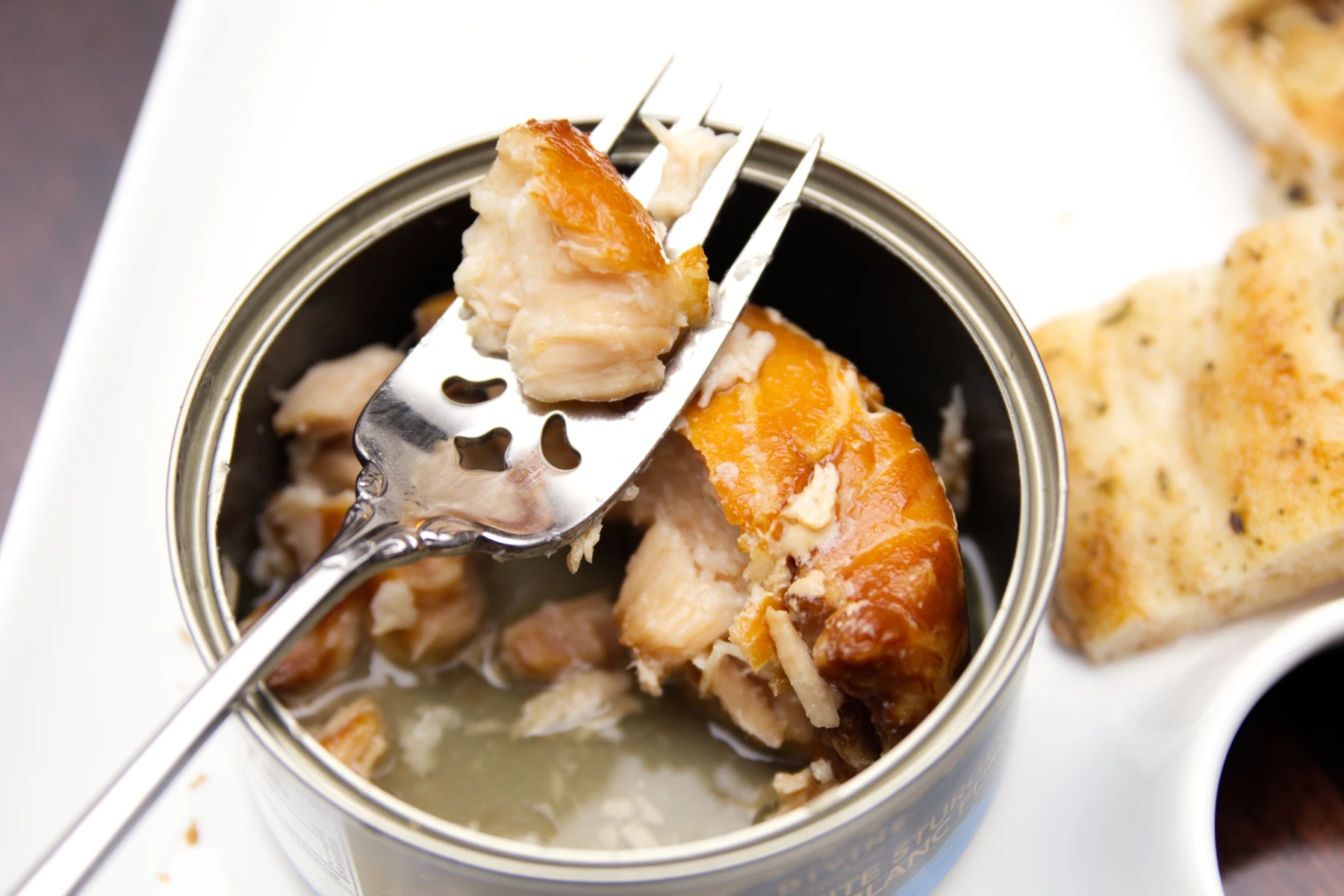Northern Divine Smoked White Sturgeon
Sturgical Precision
Originally Published: Monday, June 24, 2024
Specs
 Disappointingly, not 160 grams of caviar.
Disappointingly, not 160 grams of caviar. A Row on Roe
Today’s spotlight is a British Columbia based company that gained their fame producing the most expensive seafood products in the world: sturgeon caviar. Northern Divine Aquafarm is a BC-based sturgeon farm that specializes in sustainable and eco-friendly methods of harvesting caviar, and were considered a forerunner and pioneer in sustainable sturgeon farming.
Wild sturgeon caviar harvesting is decimates the sturgeon population since it often targets fish that are tens of years to decades old. The most sought-after caviar is from that of the beluga sturgeon, a critically threatened species that is unfortunately often the victim of illegal poaching.
As different countries started to outlaw wild sturgeon harvesting to protect delicate populations, various aquafarms began their experiments on farming sturgeon for the purpose of producing sustainable caviar. The largest producer of farmed caviar in the world is unsurprisingly China, but our featured producer today predates China’s largest aquafarm by about ten years, making them a true pioneer in the field.
The caviar produced by Northern Divine is from a species of sturgeon that’s indigenous to the Fraser River valley, the white sturgeon. Although the caviar from the white sturgeon is considered a “replacement” product of traditional caviar, it still contains many of the subtle and delicate flavours that make these pearly gems so popular. The white sturgeon has been an important food source to the people of the Fraser River Valley since the beginning, so it’s a fitting target for sustainable farming operations in the area. The local white sturgeon population were almost hunted to extinction in the early 20th century, so farms that may help to recover their numbers are potentially beneficial.
Northern Divine’s caviar is often praised as some of the highest quality sustainably farmed caviar that you can buy, as well as being extremely competitively priced for the quality. I’ve had their caviars before, and while I would never categorize a caviar as “affordable”, they are nevertheless a product that’s earned its price tag. Anecdotally, the success of farmed, sustainable caviar has dropped the general demand for wild caviar significantly, allowing some populations of wild sturgeon to recover a bit.
Even though I’ve waxed poetic about caviar, this review is not about the little shimmmery roes (maybe I’ll feature one for my birthday or Christmas or something.) Today’s spotlight is an oft-overlooked byproduct of caviar harvesting, sturgeon meat. Specifically, the Smoked White Sturgeon cans from Northern Divine.
For a company that markets themselves as being sustainable, it’s only natural that they should attempt to use all parts of the fish from their farming operations. Sturgeon is not a commonly seen fish in the canned food market, despite its importance throughout human history as a major food source to civilizations that are lucky enough to have access to it.
My choice today is also partially based on a sneaking suspicion I have that the product is packed by St. Jean’s Cannery, the last cannery in BC. I have no strong evidence that is the case except for the shape and labelling of the can. If anyone can prove or disprove this, I would love to know more.
On with the review!
Gouda of the Sea?
As with all smoked fish products, I’m always looking forward to that initial bouquet of fumes that pour forward from opening a sealed can. This product delivered, with a promising nose that reminded me a bit of a smoked gouda or ham, full of meatiness and flavourful compounds intermingled with burning wood. There was minimal liquid in the bottom of the can, meaning little difference between the net weight and drained weight.
The glossy surface of the fish fillet was a sooty orange-pink, akin to salmon. Veins of lighter-coloured fat ran through the flesh, creating striated layers in the fish. This can was beautifully packed with little wasted space and no breakages, delivering a beautiful baseball steak of a fish fillet.
 Looks divine.
Looks divine.Separating the meat took more effort than anticipated as the fillet retained an excellent structure and texture; a satisfying density that resisted prodding from a fork. Smokey notes and more meaty flavour compounds were released as I dug in deeper with the fork. Strong fish odours were surprisingly absent, possibly masked by the smoke.
My first bite of the product was on its own to get a good baseline. The flesh had a meaty chewiness to it, denser than tuna and not as flakey. The flavour was light and not overly salted, and the smoke ended up more subtle in the mouth compared to the nose. The light pink interior of the fillet was appetizing to the eye, and probably closer to the original colour of the fish pre-smoking. Even the bits that did flake off kept their shape well.
I put the next few bites on some garlic flatbread to see how it would stand up to something relatively pungent as a pairing, and it held its own quite well. The smokiness helped to prevent the fish from fading into the background and stopped the garlic from taking over. The natural flavours of the sturgeon, although subtler than tuna or salmon, snuck through without fail. There was a tiny bit of sweetness at the end of each bite that helped to reset the palate for the next morsel.
 A beautifully succulent bite.
A beautifully succulent bite.The veins of fat that were unevenly distributed throughout the fillet were little pockets of hidden treasures as they altered the mouthfeel dramatically. The fattier areas retained a good amount of moisture and offered more fishy flavour, creating a forkful that was melt-in-my-mouth. The only downside was that there weren’t enough of the fatty bits to go around. This buttery fattiness along side the woody smokiness really helped to cement my association of it to a nice smoked gouda, albeit cognitively a bit strange.
The Verdict
So, was it worth it? At around $13 CAD per 160 gram can, these are not the cheapest fish cans on the shelf. However, it is a locally produced and sustainable product featuring a type of fish that’s not commonly found in cans. Besides all of that, it is a very yummy treat.
I could see this product replacing a can of tuna or salmon to create an elevated version of the same recipe, but it’s perfectly enjoyable on its own with some bread or crackers.
 The fatty pockets of hidden treasure.
The fatty pockets of hidden treasure.Unfortunately, this product seems to have disappeared off the shelves. I’m not sure if there’s an issue with the production or distribution, but the few stores that carried them in my neighbourhood no longer showcase them. Hopefully, the product hasn’t been discontinued entirely because that would be a great shame since it’s a perfect complementary product that attempts to make use of the rest of the animal.
In terms of taste, it’s undoubtedly a Yum. As for value, it was something that I mulled over for a while, flopping between 2 or 3 stars. In the end I give it a (high) 2-star rating for the quality and versatility of the product marketed at an attainable price. Probably a bit pricey for everyday consumption, but I would love to try a sturgeon salad sandwich made with this (in fact, I may do just that with my next can if I can find some on the shelves).